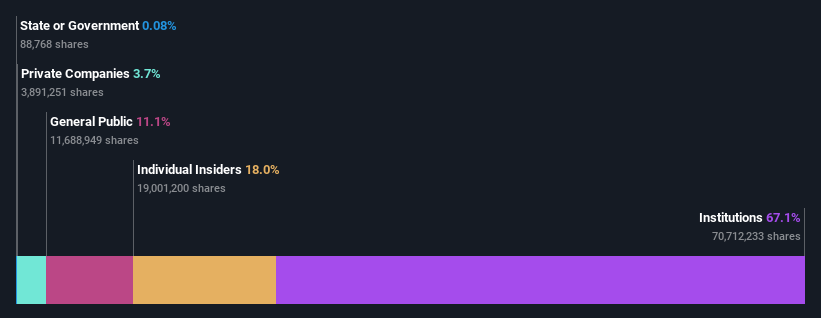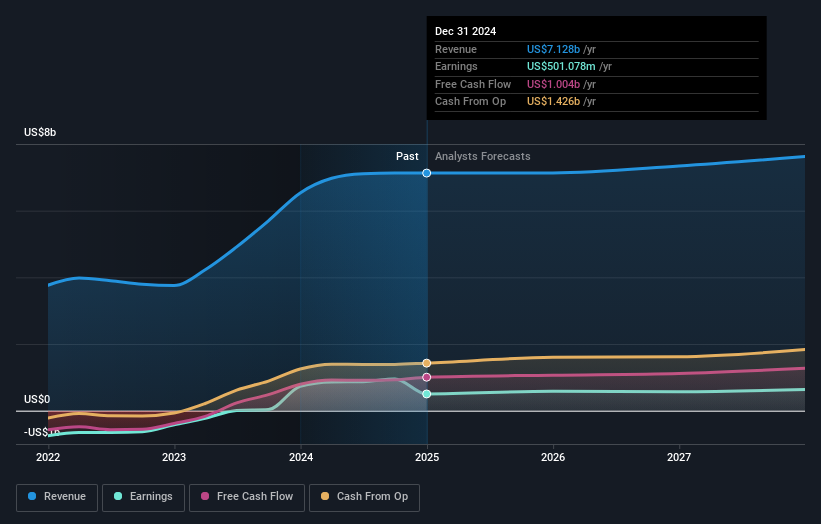- United States
- /
- Hospitality
- /
- NasdaqGS:WYNN
Institutional owners may consider drastic measures as Wynn Resorts, Limited's (NASDAQ:WYNN) recent US$1.4b drop adds to long-term losses

Key Insights
- Institutions' substantial holdings in Wynn Resorts implies that they have significant influence over the company's share price
- A total of 10 investors have a majority stake in the company with 50% ownership
- Insiders have bought recently
Every investor in Wynn Resorts, Limited (NASDAQ:WYNN) should be aware of the most powerful shareholder groups. The group holding the most number of shares in the company, around 67% to be precise, is institutions. In other words, the group stands to gain the most (or lose the most) from their investment into the company.
And institutional investors endured the highest losses after the company's share price fell by 15% last week. The recent loss, which adds to a one-year loss of 31% for stockholders, may not sit well with this group of investors. Institutions or "liquidity providers" control large sums of money and therefore, these types of investors usually have a lot of influence over stock price movements. As a result, if the downtrend continues, institutions may face pressures to sell Wynn Resorts, which might have negative implications on individual investors.
In the chart below, we zoom in on the different ownership groups of Wynn Resorts.
Check out our latest analysis for Wynn Resorts

What Does The Institutional Ownership Tell Us About Wynn Resorts?
Many institutions measure their performance against an index that approximates the local market. So they usually pay more attention to companies that are included in major indices.
We can see that Wynn Resorts does have institutional investors; and they hold a good portion of the company's stock. This suggests some credibility amongst professional investors. But we can't rely on that fact alone since institutions make bad investments sometimes, just like everyone does. If multiple institutions change their view on a stock at the same time, you could see the share price drop fast. It's therefore worth looking at Wynn Resorts' earnings history below. Of course, the future is what really matters.

Investors should note that institutions actually own more than half the company, so they can collectively wield significant power. Wynn Resorts is not owned by hedge funds. Our data shows that The Vanguard Group, Inc. is the largest shareholder with 9.7% of shares outstanding. For context, the second largest shareholder holds about 9.1% of the shares outstanding, followed by an ownership of 8.3% by the third-largest shareholder.
On further inspection, we found that more than half the company's shares are owned by the top 10 shareholders, suggesting that the interests of the larger shareholders are balanced out to an extent by the smaller ones.
While it makes sense to study institutional ownership data for a company, it also makes sense to study analyst sentiments to know which way the wind is blowing. Quite a few analysts cover the stock, so you could look into forecast growth quite easily.
Insider Ownership Of Wynn Resorts
The definition of company insiders can be subjective and does vary between jurisdictions. Our data reflects individual insiders, capturing board members at the very least. Management ultimately answers to the board. However, it is not uncommon for managers to be executive board members, especially if they are a founder or the CEO.
Most consider insider ownership a positive because it can indicate the board is well aligned with other shareholders. However, on some occasions too much power is concentrated within this group.
It seems insiders own a significant proportion of Wynn Resorts, Limited. It is very interesting to see that insiders have a meaningful US$1.5b stake in this US$8.6b business. Most would say this shows a good degree of alignment with shareholders, especially in a company of this size. You can click here to see if those insiders have been buying or selling.
General Public Ownership
The general public-- including retail investors -- own 11% stake in the company, and hence can't easily be ignored. While this size of ownership may not be enough to sway a policy decision in their favour, they can still make a collective impact on company policies.
Private Company Ownership
Our data indicates that Private Companies hold 3.7%, of the company's shares. Private companies may be related parties. Sometimes insiders have an interest in a public company through a holding in a private company, rather than in their own capacity as an individual. While it's hard to draw any broad stroke conclusions, it is worth noting as an area for further research.
Next Steps:
I find it very interesting to look at who exactly owns a company. But to truly gain insight, we need to consider other information, too. Like risks, for instance. Every company has them, and we've spotted 3 warning signs for Wynn Resorts (of which 1 is significant!) you should know about.
Ultimately the future is most important. You can access this free report on analyst forecasts for the company .
NB: Figures in this article are calculated using data from the last twelve months, which refer to the 12-month period ending on the last date of the month the financial statement is dated. This may not be consistent with full year annual report figures.
If you're looking to trade Wynn Resorts, open an account with the lowest-cost platform trusted by professionals, Interactive Brokers.
With clients in over 200 countries and territories, and access to 160 markets, IBKR lets you trade stocks, options, futures, forex, bonds and funds from a single integrated account.
Enjoy no hidden fees, no account minimums, and FX conversion rates as low as 0.03%, far better than what most brokers offer.
Sponsored ContentValuation is complex, but we're here to simplify it.
Discover if Wynn Resorts might be undervalued or overvalued with our detailed analysis, featuring fair value estimates, potential risks, dividends, insider trades, and its financial condition.
Access Free AnalysisHave feedback on this article? Concerned about the content? Get in touch with us directly. Alternatively, email editorial-team (at) simplywallst.com.
This article by Simply Wall St is general in nature. We provide commentary based on historical data and analyst forecasts only using an unbiased methodology and our articles are not intended to be financial advice. It does not constitute a recommendation to buy or sell any stock, and does not take account of your objectives, or your financial situation. We aim to bring you long-term focused analysis driven by fundamental data. Note that our analysis may not factor in the latest price-sensitive company announcements or qualitative material. Simply Wall St has no position in any stocks mentioned.
About NasdaqGS:WYNN
Very undervalued low.
Similar Companies
Market Insights
Community Narratives





